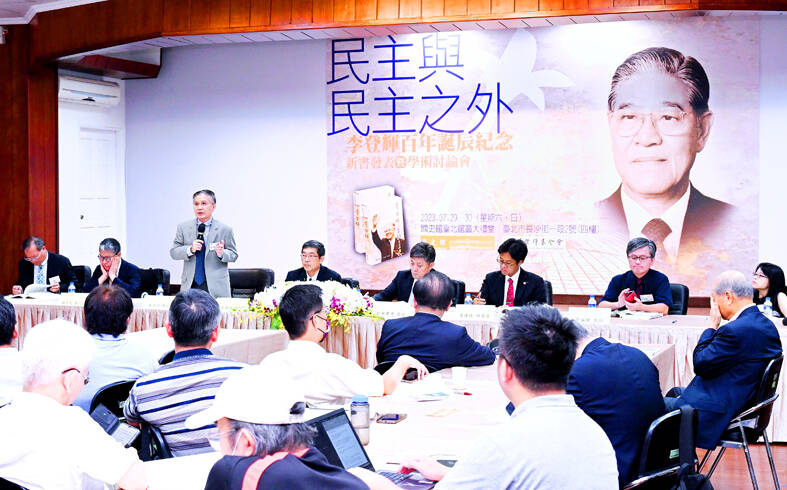Former president Lee Teng-hui (李登輝) did not rely entirely on the US to procure arms, but instead divided the channels his administration used for arms purchases across several countries, a researcher said on Sunday.
For example, Lee secured German and French naval vessels, French Mirage 2000 fighter jets and US F-16 jets during his time in office, said Lin Hsiao-ting (林孝庭), a research fellow and curator of East Asia collections at the Hoover Institution Library and Archives.
Lin made the comments via videoconference at a launch event for a book commemorating the life of the late former president held by Academia Historica on Saturday and Sunday in Taipei. Sunday also marked the third anniversary of Lee’s death.

Photo: Fang Pin-chao, Taipei Times
Yasuhiro Matsuda, a professor of international politics at the University of Tokyo’s Institute for Advanced Studies, also attended the event, along with 14 other researchers in the fields of politics, diplomacy and cross-strait relations, transitional justice, economics and social affairs.
Lin said that following the signing of the US-China joint communique on Aug. 17, 1982, Taiwan’s government and military became concerned that the US would gradually decrease its annual sale of arms to Taiwan, spurring Taiwan’s domestic arms industry.
At the same time, it sought to diversify its foreign sources of defense weaponry, he said, adding that Lee was very active on the issue.
Originally the US did not want to sell fighter jets to Taiwan, but later learned that Taiwan was in negotiations to buy jets from France, he said, adding that the Republicans then agreed to sell jets to Taiwan to bolster the campaign of former US president George H.W. Bush, who was running for the presidency at the time.
However, in a rare move, Lee rejected the US offer and proceeded with the procurement of Mirage fighters from France, Lin said.
Three things contributed to Taiwan’s breakthroughs in international arms procurements during Lee’s administration, he said.
First, the Cold War was coming to an end, which meant arms manufacturers were eager to find new markets, Lin said.
Second, after the Tiananmen Square Massacre in Beijing in 1989, China’s international image was badly damaged, putting it at a diplomatic disadvantage and making countries more willing to engage with Taiwan, he said.
Third, Taiwan’s economy and strength as a trading partner had grown since the 1980s, enabling Lee to promote a “pragmatic foreign policy,” Lin said.
Taiwan’s military posture under Lee had also changed from that of former Taiwanese presidents who had ambitions of “taking over mainland China,” to a defensive stance, he said.
Lee was president from 1988 to 2000. As vice president, Lee succeeded then-president Chiang Ching-kuo (蔣經國) after he died in January 1988.
Lee became Taiwan’s first directly elected president in 1996.

A relatively large earthquake may strike within the next two weeks, following a magnitude 5.2 temblor that shook Taitung County this morning, the Central Weather Administration (CWA) said. An earthquake struck at 8:18am today 10.2km west of Taitung County Hall in Taitung City at a relatively shallow depth of 6.5km, CWA data showed. The largest intensity of 4 was felt in Taitung and Pingtung counties, which received an alert notice, while areas north of Taichung did not feel any shaking, the CWA said. The earthquake was the result of the collision between the Philippine Plate and the Eurasian Plate, the agency said, adding

Snow fell in the mountainous areas of northern, central and eastern Taiwan in the early hours of yesterday, as cold air currents moved south. In the northern municipality of Taoyuan, snow started falling at about 6am in Fusing District (復興), district head Su Tso-hsi (蘇佐璽) said. By 10am, Lalashan National Forest Recreation Area, as well as Hualing (華陵), Sanguang (三光) and Gaoyi (高義) boroughs had seen snowfall, Su said. In central Taiwan, Shei-Pa National Park in Miaoli County and Hehuanshan National Forest Recreation Area in Nantou County saw snowfall of 5cm and 6cm respectively, by 10am, staff at the parks said. It began snowing

HOLIDAY EXERCISE: National forest recreation areas from north to south offer travelers a wide choice of sights to connect with nature and enjoy its benefits Hiking is a good way to improve one’s health, the Forestry and Nature Conservation Agency said, as it released a list of national forest recreation areas that travelers can visit during the Lunar New Year holiday. Taking a green shower of phytoncides in the woods could boost one’s immunity system and metabolism, agency Director-General Lin Hwa-ching (林華慶) cited a Japanese study as saying. For people visiting northern Taiwan, Lin recommended the Dongyanshan National Forest Recreation Area in Taoyuan’s Fusing District (復興). Once an important plantation in the north, Dongyanshan (東眼山) has a number of historic monuments, he said. The area is broadly covered by

COMMUNITY SPIRIT: As authorities were busy with post-typhoon cleanups elsewhere, residents cleaned fallen leaves and cut small fallen trees blocking the hiking trails All hiking trails damaged by Typhoon Kong-rey have been repaired and has reopened for people who want a refreshing hike in Taipei during the Lunar New Year holiday, a city official said. The Taipei Basin is known for its easily accessible hiking trails. It has more than 130 trails combined into the 92km-long Taipei Grand Trail, which was divided into seven major routes when it was launched by the Taipei City Government in 2018. Last year, a part of the sixth route of the Grand Trail collapsed due to Typhoon Kong-rey, which hit Taiwan in October. The damaged section belongs to one